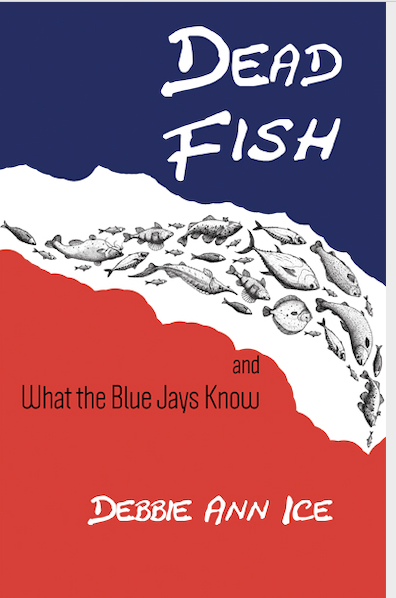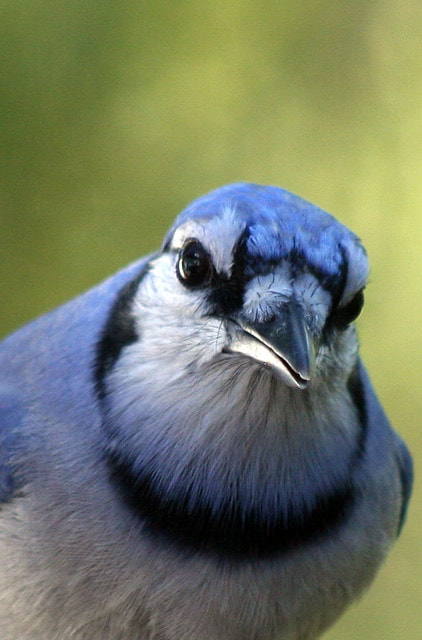|
were t
So, we get to put our feeders back up, says CT Audubon. More about what happened when I put them back up. But I'd like to discuss what happened when we all took them down. Of course, the birds flew away and the yards were quiet again. But, importantly, the blue jays disappeared, and I think it's quite fascinating how that impacted the entire community. The blue jays were integral to the community. Once they left, everything came to a quiet hault. OK, I admit I'm biased. I love blue jays. I wrote a novel and gave a flock of them a voice, not just for fun but because I noticed they had a voice--a strong, loud and vibrant voice. A voice that changes depending upon mood and danger. One voice perhaps for me when at the feeder, another for predators, another for mates, another for offspring and one for just sitting around happy. They also imitate--hawks mainly. And, importantly, blue jays notice. They notice other birds, they notice the squirrel, the rabbits. And they notice the hawk. So, I chose the blue jay for my strong bird character who has a voice and notices. But I am not pointing to the blue jays' importance because I love blue jays. The blue jays have always guarded the neighborhood and alerted all of to the presence of the dreaded hawk. While the blue jay are protecting their nest and families, they're also protecting the community. I've seen a flock of them save a squirrel. I've seen them swarm a hawk after a rabbit. When they screamed, if I were home, I'd walk out and try to find the hawk. I know they saw me, I know they understood this was their job. I tossed them peanuts on occasion in the evening when I came home, particularly if they did a good job screaming hawks away. After the feeders were taken down, the blue jays flocked me for a while and screamed, but eventually they flew off. I suspect they migrated to areas full of insects, less foraged than my pond. I did find several at one walk with my dog. The walk was by a small pond with overgrown algae and a shoreline filled with tangled grass and weeds and all kinds of insects. As soon as I approached the pond, the air filled with blue jay screams. I was glad they were feasting on healthy meals. When the blue jays disappeared from our yard, so did other birds. That may not at all be connected to the blue jay. Once the human stops feeding, all birds will go elsewhere for food. This was what Audubon CT wanted, a disbursement of passerines, a bird social distancing. But when the blue jays left, it wasn't just the other birds that left. Squirrels disappeared. Rabbits disappeared. Chipmunks stayed away. Sure chipmunks were there, somewhere, but they did not show their cute faces to the world as often when the police disappeared. Only the Turkeys and ducks still walked the property. And, of course, the hawks came out. They flew quietly in the air, their shadows flicking across the yard--the only hint to their presence. They sat patiently hidden behind verdant branches. Occasionally they made these quiet, quick screeches to each other. I assumed these were parents talking to the offspring. They were teaching hunting skills. They were all more successful with no blue jay loudly announcing their presence. So, the raptors hunted freely. And the animals noticed. Basically, at least in my community, which includes not just my yard, but the entire neighborhood, the police disappeared. And when there's no police, it's best to stay hidden, or find communities that have police. Communities filled with blue jays. Last week, the Audubon CT sent out a news release advising everyone that feeders can go back up. The number of ill birds has dropped to a level that is acceptable. As long as everyone thoroughly washes feeders once a week with a bleach solution, they are good to go. I usually wash every few days and bleach soak once a month anyway. So, I put up the feeders. The chickadees arrived after a few hours. A few sparrows. A couple of doves appeared under the underpopulated feeder. After a day or two, I heard the screams in my canopy. The blue jays were back. One molting blue jay tasted some seeds and that was it. The jays didn't really eat much that I offered. I tossed some peanuts and only two blue jays picked them up. There are so many insects in the humid air, they were fine with food. But they were here. Did they notice the feeders and decide to roost in the canopy and eat insects around it. Why? Soon, the finches and sparrows, nuthatches, titmouses, goldfinches all arrived. And that afternoon, the chipmunks skittered around. The squirrels were still scarce, and I've seen only one rabbit. However, we've had an abundance of coyotes and many sightings of coyote pups early in the summer, so I assume there were out with their offspring teaching hunting. And, again, there were no blue jays to warn prey of dawn and dusk hunts. I hate doing this, but just this once I'll tell this story without linking an article for back up. I can't find it. I will keep trying. Anyway, here's the story. In England there was a small lake where everyone visited with their bags of bread to feed ducks. Bread, as most birdlovers know, is bad for ducks. It absorbs water in the stomach, reducing appetites and resulting in malnutrition. They warned residents to stop, but they still showed up and fed the ducks. The community of ornithologists became frustrated and finally convinced everyone to stop feeding the ducks. I don't know how. Signs. Articles. Maybe the bird scientists walked around shaming everyone. I have no idea. But, everyone stopped. Within a few months, residents started finding starving ducks. Many starved to death. Ornithologists were so concerned, they recommended everyone feed the ducks again. What happened? Why didn't the ducks forage and eat healthy food? Well, maybe, the ducks came to the lake not because it had enough food for all of them, but because it had enough bread for all of them. Once that bread was abruptly taken away, the lake could not provide enough nutrients for all the ducks. Why didn't the ducks fly away? Who knows? Many probably were raised eating bread and had had never traveled to another area during this time. Maybe parents had planned their nesting around the human feedings and could not leave their young. And maybe, just maybe, they were dependent not only on the bread, but also on the comfort of community. Unlike these English ducks, our passerine bird feeders usually provide only a small fraction of food intake. I do think they rely on the feeders during May and June nesting season and may plan nesting accordingly. But, in my non-science-simply-observing opinion, the feeders (and this may be why the ducks didn't fly away, too) provide a different type of dependence--community. I realize some ornithologists look down upon the feeder community. Feeding birds creates a kind of dependence. It can also create a petri dish of diseases if you do not clean often and birds eat to close together--spreading illnesses. I also think this dependence can result in too many birds occupying a territory that does not naturally have enough food for them. That can be dangerous when birds nest and create communities solely because of the feeders, and then the feeders go away. I think we all get this. We have to be careful not to overfeed. But maybe the ornithologists need to study something else the feeders are providing--an interdependent community. When the feeders went back up, blue jays arrived not because they needed the food, but because the feeders signaled that birds were once again welcome. The blue jays came back to the community to open up the police department.
0 Comments
Leave a Reply. |
AuthorI like to write about people, animals, dogs. I enjoy ideas, good books about ideas, funny books about ideas, funny people who have ideas, advocates for people who don't have voices to express their ideas, and animals who have ideas we can't understand. Archives
November 2021
Categories |


 RSS Feed
RSS Feed